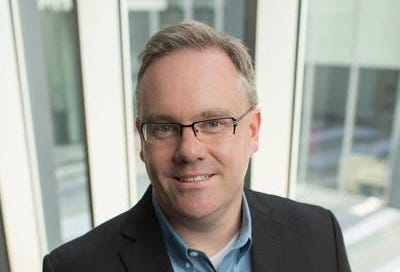Iain Vasey, president and CEO, Corpus Christi Regional Economic Development Corporation
Iain Vasey is an experienced Economic Development and Real Estate professional specializing in complex transactions and major site selection actions. He has experience in developing and leading nationally-recognized economic development programs, and building highly-competent professional teams that have achieved their goals and objectives.
With 20 years of experience in economic development, from both the public- and private-sector perspectives, he is considered a leader in developing new programs, re-focusing organizations, achieving outcomes, and building functional and effective teams that carry out core-mission strategies.
He has made a number of presentations on the subject of economic development, and is a Certified Economic Developer through IEDC, where he has also spoken at national conferences and instructed classes on the subject.
Below is the raw, unedited transcript from our artificial intelligence translator.
Iain Vasey
Hi I'm Iain Vasey with the corpus Christi regional economic development Corporation and I'm the president and Ceo
Jason Spiess
before we get into the new Exxon ethane cracker plant that's going to be built down there in Corpus Christi. Talk about your Corpus Christi Regional Economic Development Corporation for a minute or two if you would.
Iain Vasey
Okay we are Jason we are a not for profit corporation that's public private partnership that is supported by both the business community here in the region and also um various government agencies and counties and cities um the cities of Portland and um and Gregory and corpus Christi. Um our some of our partners support of Corpus Christi as a partner and also new Oasis county, aransas county and san Francisco county.
So we represent a three county kind of the S. A. For the corpus Christi region. And we provide economic development services which include business attraction, business retention and expansions. But we also do national level marketing and we maintain and provide data on what's happening in the regional economy as well. So it's kind of a full service economic development group that serves this metro area.
Jason Spiess
Before we get into the interview at hand, I wanted to ask you just if you heard the recent data, I talked to a gentleman from the Federal Reserve Bank of Dallas the other day about the oil and gas job report about how basically half of the jobs if what was it? Whatever the amount of jobs were one out of two were basically in texas meaning texas added half the jobs in the oil and gas industry. Are you seeing that down in your neck of the woods that the oil and gas industry are?
Iain Vasey
So we've seen really, if you think about in the last five or six years, so 2010 11, we started getting into the kind of the shale revolution where directional drilling and micro seismology really started changing how companies were able to extract oil and gas out of the south texas strata. So what we saw is wells becoming much more efficient micro seismology meaning that there hasn't really been in the last couple of years, dry wells drilled, it used to be that you just drilled
vertically and have to move wells around. Now you've got these wells that go pipes that essentially go out in directional drills that go out about a mile or two miles even in each direction. Now, what does that mean? We saw all prices maintained, kind of building up through, I suppose a high point in the 2014 area, in fact, right around Thanksgiving 2014, there was all prices were north of $100 production level and then 95 million barrels a day kind of kind of region worldwide.
And so we started to see a slide in employment and rig counts got cut back. So we ended up with um, you know, kind of at a high point in the Eagle ford, which is, which is one of the, one of the shale plays, just just a planned from us right here in Corpus Christi. So we saw north of 400 wells at peak and the, that kind of fell to an early point of 2016, probably february 2016 of around 30 something well.
So we saw a huge amount of layoffs in that 4014, 15 was a starter slide 16 wasn't a great year. In fact, 16 was a very poor year for unemployment in the oil and gas sector Now, since, since that, that kind of low point, it's stabilized in, You know, kind of building back up in the second half of 2016 and now we're well over 100 rigs in the, in the eagle, it's coming back very strongly, so, you know, 16 was a bad year for for, for the oil and gas sector, 15 and 16 were both bad years, 17 were
starting to really see the unemployment rates actually, it's not even the unemployment rates that are changing because you're seeing job count as significantly increase in those. So boy, I know that's way more than a lot of folks wanted to hear, but so we saw that kind of the build up in 2011, 12, 13, 14 and peaked 15, it kind of started
going downhill. 16 was bad and we're starting that recovery again. So we're starting to see a lot more jobs being created in the energy sector, especially in south Texas.
Jason Spiess
Now let's talk about the Exxon plant being built down in your neck of the woods. Um is this, is this something you guys lobbied for for a number of years did it just didn't work out I guess talked about the origin of how this thing got to where it's going to be at. You
Iain Vasey
know, let me talk about this. We see a lot of deals that you would be shocked at how often either a law firm or site selection consultant or some other type of consultant knocks on our door and says, you know, we've got a client that's looking to build a do a billion plus dollar investment. We're looking for 1000 acres or what have you, you know, and we fill out our FPs and sometimes you work these deals and they're never real.
Um, and then, so you know, we got an RFP that came across the our desks called this code name project Yosemite, which was a similar kind of deal to what I just described and you know, we filled it out and send it back and there was a law firm involved in the Governor's Office of economic Development was involved and they said, you know, we like your area, we like your labor analytics, like your logistics, we like your infrastructure from the deep water ports and things like that.
But that site just doesn't really work. So we went back and studied some more sites and submitted those and you know, we got back some more questions. We love this area and this is going on over the course of the best part of the year. Um, and, and, and we get, you know, to the point where they're saying more questions, more questions, alternative site, let's look at some things.
And so we had a real estate consultant, local guy working with us and we had engineers, you know, when you get 100 questions on engineering and soil pipes and you know where our pipelines and let's flow and what amount of water can you provide, You know, all of those questions we have to, we really play economic development game a little bit different than we ever did 20 something years ago.
You know, we are very technical driven, there's a lot of engineering and a lot of financial analysis that goes into it. And so I'm sitting in one of my, my team's offices and we basically had to get to a point where we're spending quite a bit of money on engineering feasibility with a company that we didn't know who it was. So we pushed back on the law firm that was involved and they said, you know, it's a very real client.
I said, look, I'm not willing to spend another $10,000 on engineering if we don't know who it is, it's probably not a real company. And so he sent over nondisclosure agreements and in hindsight, I can talk about this, um, sent over nondisclosure agreements for sure about 20 pages long meaning like you promised your firstborn child if it's, you know, it's disclosed on this project. But the names Exxon and Sadiq and Sadiq being sad Arabian basic industries corporation.
So two giants were partnered on this deal and, you know, things got very real after that. So we, we got into some major site selection feasibility engineering analysis. How do we build the infrastructure? How do we get heavy lift roads? How do we get the amount of power for for projects like this? I'd say all told it was, you know, somewhere between 18 months and two years worth of process that that it took to get this deal to the point where it's at right now. ...
Jason Spiess
So where is that right now? Um, what are some of the timelines and milestones that you guys are trying to trying to accomplish
Iain Vasey
the information that that is in the public realm is that the company has optioned a piece of property, um, it's a partnership that, that called gulf coast growth Ventures, which is a partnership between Exxon and static, but it's Exxon being the lead partner, they've optioned to be so property they've filed for permits through, which is the texas Commission on environmental quality.
They'll go through probably that permitting process for a large scale project is probably no less than nine months and more likely closer to 24 months. So 1 to 2 year kind of time frame to clear all the permits and then um you know, should they clear all of those permits through both the state and federal governments? Um We should see probably activity. We should see nothing before probably the end of 2018 for moving derek potentially more like 2019.
And then it's probably about a four year four year time frame to build facilities of this scale. So when you're talking about $10 billion investment, you don't wave a magic wand and something gets built overnight. It takes several years to build. And uh you know, they're going to have potentially, you know, as many as 4 to 5000 construction workers on site at peak. So it's it's gonna be a several year process to build these things. How
Jason Spiess
About just a couple of numbers 4-5,000 construction workers at its peak. How many employees are gonna be uh part full time employees at the plant. And you guys have any like rough economic impact numbers that either it's gonna have before and after. Sure.
Iain Vasey
Well, you know, the companies are gonna invest close to $10 billion. The numbers that they're committed to are about 640 Full time professional level jobs. Um plus whatever I think that's probably additional support part time and contract folks. But 640 full time jobs, the average salaries of those 640s about $90,000 a year. Um It will create somewhere north of direct spending within this local market every year upon operations somewhere north of $50 million in payroll.
So if you think about, you know, kind of $50 million injection every year for the next, you know, 40 50 years or even more of payroll, it's several, several billion dollar um um kind of by the time you have the multiplier effect going through over a five year period. So um, this is probably one of the largest economic impact deals in uh, certainly on the gulf coast in recent memory. ...
Jason Spiess
Anything we left out, I'd like to give guest final word. Anything that we need to reiterate anything that you think should would be of interest to a capitalism, energy and gas audience out there.
Iain Vasey
Yeah. You know, one of one of the critical things that we are seeing is there's about five or six companies that are significantly investing in pipelines and distribution networks to bring both oil, crude oil and natural gas and natural gas liquids from the Permian Basin Eagle for basin down towards Corpus Christi. And one of the things we're hearing is that those companies are investing infrastructure to bring product here because the poor of Corpus Christi is a lot less
congested than some of our other ports that you might see at, say Houston. Um so we'll see a lot less congestion there, bringing product down natural gas liquids being a feedstock. So ethane as an example being a feedstock that goes into the plastics industry, we're starting to see a lot of activity. We've got a lot of other companies that are kicking the tires, I'd say there's probably another, Probably another 10 major industrial projects that are kicking the tires on various
cities from, I'm gonna say Brownsville, all around the Gulf coast to say, you know, the kind of New Orleans area. And um you know, we're all actively competing for this. This is this is kind of the next generation of the, of the petrochemical manufacturing wave that we're seeing.
Jason Spiess
That's amazing. You know, when you were talking, it kind of reminded me of up in the bacon, there's the Meridian Energy Group is building the Davis refinery, the first Greenfield full on refinery in the last 50 years, the United States. And part of the process of doing the story on that. Um we uncovered a study that was done in the state of Washington about refineries and I can't remember the name of the study off top of my head, but it basically said that for every job, one of these
refineries brings in like the one you guys have building down there, The ethane cracker, one by Exxonmobil or the Davis refinery up in the bacon, by the Meridian Energy group, it brings 12 jobs. So they're bringing 200 jobs to the Davis refinery that's going to have a 24 $100 or 2400 person impact out in a community where the town it's going in doesn't even have 2400.
So some of the suburb areas are gonna obviously grow in size. But Have you guys gotten down to that? You mentioned the $50 million dollars in salary and you started talking about some of the ripple effect. But have you guys analyzed that yet or is that still a little bit too far in advance? You know,
Iain Vasey
we we we we do it it's just one of those things that when you start talking about indirect and you know there's the direct impact and the indirect impact which is the contractors, the company and then there's the induced, which is kind of the, you know, will, you know, the company being the direct contractors being the indirect and induced the sandwich shut down the street.
Those are very hard numbers. We do have calculations but we very much prefer to talk about the direct impact. One of the other things that that's actually really important and we've been able to put in all the agreements with the companies is that they are giving preference to hiring local vendors and suppliers. Um So if there's a company that's located here in one of the, one of the counties here that wishes to become a supplier of everything from either welding services, moving
dirt operations, even janitorial and the guy that makes the sandwiches that goes into, you know to feed the cruise, they're going to be trying to hire local company. So we've really structured agreements, we've put a lot of thought into how do we make sure that local companies benefit from a major project locating in order we spend a lot of time on that. It's going to be the direct and indirect benefit. It's probably going to be in the $2 billion range. Now we don't use numbers like
12, 12 additional employees. Multiplier effect were very much more conservative than that were probably the 3 to 4 range but still If you get 650, direct jobs you're looking at, you're looking at, you know, 3000 jobs potentially. Um all told directly supporting that from an overall perspective, that means um just this one project will move our employment numbers about 1.5 maybe as much as 2% across the entire metro area from one project.
Jason Spiess
Well, those are good problems to have and good numbers to parse and splice out and everything like that. So um well thank you for your time today, appreciate it,
Iain Vasey
enjoyed it and thank you to you and your group
Iain Vasey has resigned from his position as president/CEO of the Corpus Christi Economic Development Corp. in July 2022. Interview conducted on June 6, 2017.
Sponsors, Music and Other Show Notes
Studio Sponsor: The Industrial Forest
The Industrial Forest is a network of environmentally minded and socially conscious businesses that are using industrial innovations to build a network of sustainable forests across the United States.
Studio Email and Inbox Sponsor: The Carbon Patch Kids
The Carbon Patch Kids are a Content Story Series targeted for Children of All Ages! In the world of the Carbon Patch Kids , all life matters and has a purpose. Even the bugs, slugs, weeds and voles.
The Carbon Patch Kids love adventures and playing together. This interaction often finds them encountering emotional experiences that can leave them confused, scared or even too excited to think clearly!
Often times, with the help of their companions, the Carbon Patch Kids can reach a solution to their struggle. Sometimes the Carbon Patch Kids have to reach down deep inside and believe in their own special gift in order to grow.
The caretakers of Carbon Patch Kids do their best to plant seeds in each of the Carbon Patch Kids so they can approach life’s problems with a non-aggressive, peaceful and neighborly solution.
Carbon Patch Kids live, work and play in The Industrial Forest.
Click here for The CarbonPatchKids’ website
Featured Music: Alma Cook
Click here for Alma Cook’s music website
Click here for Alma Cook’s day job – Cook Compliance Solutions
For guest, band or show topic requests, email studio@thecrudelife.com
Spread the word. Support the industry. Share the energy.




















Share this post